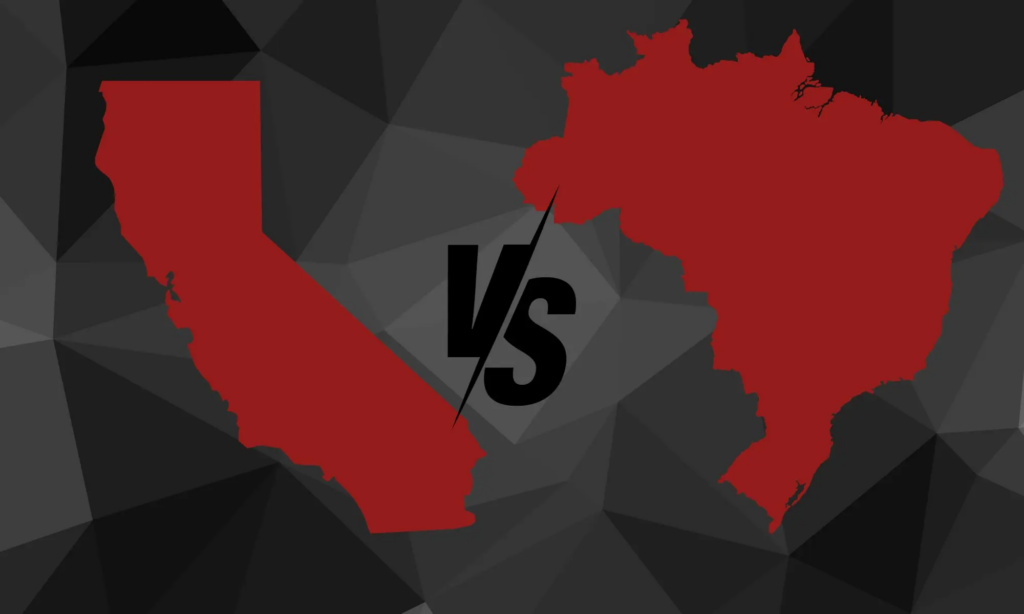
Wondering what the difference between CPRA vs LGPD is? This article provides insights into the differences and similarities between the California Privacy Rights Act (CPRA) and Brazil’s Lei Geral de Proteção de Dados (LGPD).
As businesses strive to ensure compliance with these regulations, it becomes crucial to comprehend their specifics.
Let’s delve in to gain an understanding of how these two important data privacy laws compare and what implications they hold for businesses.
Key Takeaways
The CPRA and LGPD are data protection regulations put in place to safeguard data. The CPRA is applicable to businesses dealing with Californians, while the LGPD applies to businesses dealing with Brazilians. While these two regulations have some similarities, there are also differences between them.
Both laws prioritize transparency when it comes to how businesses use data and recognize the data subject’s rights over their information.
Complying with these regulations emphasizes the importance of building trust. Businesses can seek guidance from solutions like Captain Compliance to better understand and navigate these rules.
What is the CPRA?
What is the CPRA (1).png
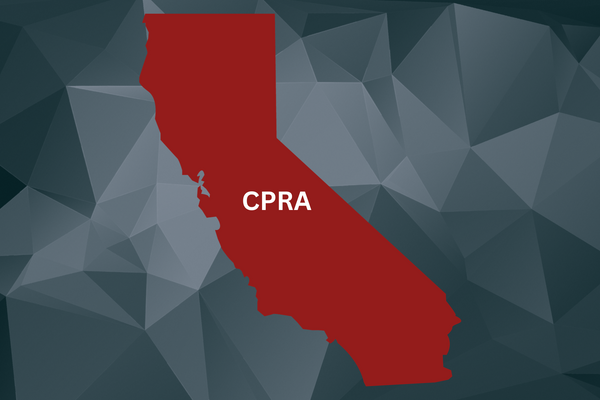
The CPRA, which stands for the California Privacy Rights Act, is a regulation in California aimed at safeguarding the data subject’s data privacy. It was introduced in response to growing concerns about the collection, use, and sharing of personal information by companies.
Building upon the foundation of the CCPA rule, the California Privacy Rights Act ensures that businesses handle data with utmost care and transparency.
Effective January 1, 2023, the California Privacy Protection Agency oversees compliance for the CPRA. This agency’s primary responsibility is to ensure that businesses adhere to the regulations outlined in the CPRA.
The CPRA applies to businesses that handle Californian data if they:
Do over $25 million in annual gross revenue
Buy, sell, or share the personal information of 100,000 or more California residents
Derives 50% or more of its annual revenue from selling or sharing California residents’ personal information
The CPRA goes beyond being another regulation, it represents California’s commitment to protecting individuals’ personal data.
What is the LGPD?
What is the LGPD (3).png
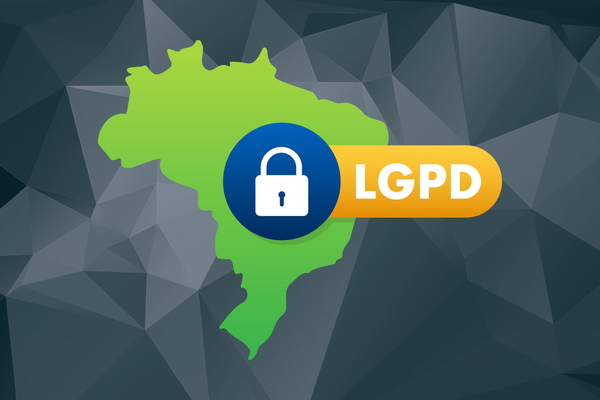
LGPD, also known as the “Lei Geral de Proteção de Dados,” is a data protection regulation created to address the issue of data privacy. Similar to California’s CPRA, LGPD aims to ensure the protection of individuals’ personal information. Brazil has taken this step to ensure that businesses handle personal data responsibly.
Since September 18, 2020, Brazil, when the LGPD became effective, has established the ANPD to oversee compliance with LGPD compliance.
This organization acts as a guardian for data protection within the country. If you run a business and collect personal information from residents in Brazil, it is essential to familiarize yourself with this regulation.
LGPD reflects Brazil’s dedication to safeguarding its citizen’s data privacy. It represents an effort to treat data with integrity and respect while providing businesses with guidelines on handling data privacy matters.
Differences Between CPRA vs LGPD
Differences Between CPRA vs LGPD.png
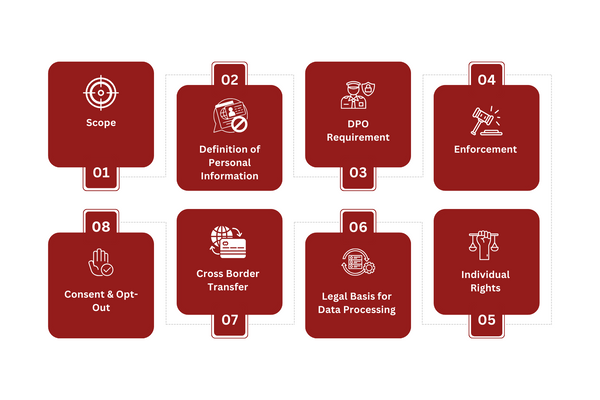
Both the CPRA and LGPD are about keeping people’s personal data safe. But they’re not the same. They have some key differences that businesses need to know. Let’s dive into what makes each of these rules unique:
Scope
When discussing CPRA scope, we are asking, “Who does this rule apply to?” In the case of the California Privacy Rights Act, it operates as a safeguard for Californian residents. Therefore, if a business deals with Californians, it must abide by CPRA rules.
On the other hand, LGPD serves as Brazil’s safety net by ensuring the security of data belonging to individuals in Brazil. So, if you find yourself dealing with Brazilian residents, you’ll need to make sure you comply with the LGPD.
Definition of Personal Information
The CPRA defines personal information as any data that can be used to identify an individual or household. This includes names, addresses, social security numbers, and more.
The CPRA also considers browsing history or even employment-related information as personal if it could potentially lead back to the identification of a person.
The LGPD of Brazil also defines personal information similarly. It includes any data that, when used alone or with other data, can help identify a natural or living person directly or indirectly.
However, the LGPD extends this definition to include digital identifiers like IP addresses and cookies if they can be linked back to an individual.
DPO Requirement
A DPO, which stands for Data Protection Officer, can be compared to a school hall monitor but for data. The LGPD mandates that businesses in Brazil must have a DPO responsible for ensuring that personal data is handled appropriately.
However, the CPRA does not require a data protection officer.
That being said, your business must still abide by CPRA’s strict and constantly changing regulations, along with a requirement for DPIAs and various other tasks that DPOs typically conduct. So, while it may not be a requirement, a DPO still makes things a lot easier.
Enforcement
The California Privacy Protection Agency (CPPA) is the primary enforcement body for the CPRA. The CPRA set up the CPPA, which can do checks, start investigations, and give fines. For intentional violations, businesses can be fined up to $7,500 per violation.
Brazil’s National Data Protection Authority (ANPD) oversees the enforcement of the LGPD. The ANPD has a range of powers, from issuing warnings to imposing daily fines.
In severe cases, businesses can face fines of up to 2% of their revenue in Brazil, limited to 50 million reais (approximately $10 million) per violation.
Individual Rights
For the CPRA, Californians can see the personal data that businesses hold. They can ask these businesses to delete their data. They can also tell businesses not to sell their data and ask about the kinds of data that have been collected about them1.
On the other hand, for the LGPD, people in Brazil can check if businesses are using their data. They can view the data that businesses have about them. If they find any data that’s wrong or old, they can ask for it to be fixed. If their data was used without their permission, they can ask for it to be removed.
Legal Basis for Data Processing
Under the CPRA, businesses can use a person’s data in a few ways. First, if the person says it’s okay (this is called “consent”). Second, if the business needs to use the data to do something they agreed to do, like selling a product (this is for a “contract”).
And third, if the business has a really good reason to use the data, even if the person didn’t say it’s okay (this is called a “legitimate interest”).
For the LGPD in Brazil, there are ten main reasons a business can use someone’s data. Some of these reasons are if the person says it’s okay (“consent”), if the law says it’s okay (“legal obligation”), and if the business has a good reason (“legitimate interest”).
Another reason is if the business needs to conduct a research study or to comply with legal obligations.
Cross Border Transfer
The LGPD in Brazil has strict rules about sending data to other countries. They only let businesses send data if the other country protects the data well or if the business shows they can keep the data safe like the LGPD wants.
The CPRA in California doesn’t talk a lot about sending data to other places. But it does say that businesses have to keep Californians’ data safe, no matter where the business is.
Consent & Opt-Out
With the CPRA, businesses have to give Californians a clear choice. They need to let them say “no” if they don’t want their personal data to be sold.
For the LGPD in Brazil, asking for permission (or “consent”) is one of ten main reasons a business can use someone’s data. When people say “yes” to letting a business use their data, they need to really understand what they’re agreeing to, and they need to say “yes” without feeling forced.
Similarities Between CPRA vs LGPD
Similarities Between CPRA vs LGPD.png
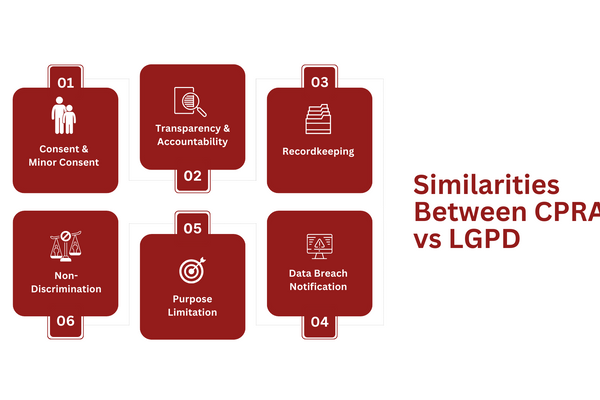
In the realm of data privacy law, CPRA and LGPD may appear to be worlds apart. However, upon inspection, they share a connection. Both share an objective: safeguarding individual personal data.
While they may adopt approaches, their underlying concern remains the same. Let’s delve into their shared values and the regulations they both adhere to.
Consent & Minor Consent
The CPRA and LGPD both believe it’s super important to ask people before using their data. This means businesses can’t just take someone’s information without asking. They have to get a clear “yes” or “no.” When it comes to kids, these rules get even stricter.
Both laws say businesses have to be extra careful. They need to get a clear okay from the guardian, especially if the data is about someone under 16 (or 18 in the case of LGPD).
Transparency & Accountability
Think about a card game where no one hides their cards, and everything is out in the open. This is the kind of openness the CPRA and LGPD expect from businesses when it comes to data.
These laws want companies to be crystal clear about how they collect, use, and share people’s information.
It’s not just about collecting data – it’s about being honest about why they need it and how they’ll use it.
If a business messes up with someone’s data, they can’t just ignore it. They need to fix the problem, and more importantly, they need to tell the person whose data got messed up. It’s like saying, “Oops, we made a mistake, and we’re fixing it.”
The CPRA and LGPD believe that businesses should own up to their mistakes and do everything they can to make things right.
Recordkeeping
Think of a diary where you write down everything you do each day. The CPRA and LGPD want businesses to keep a similar diary for data. They should write down what data they get, where it’s from, how they use it, and who can see it.
Handling personal data is a big deal. By writing everything down, businesses make sure they use the data right and fix any problems quickly. It’s about being careful and respectful with people’s information.
Data Breach Notification
If a business accidentally loses or mishandles your personal information, these rules make sure the business tells you about it.
It’s not just about the mistake but about being open and honest. Just like how you’d expect a friend to tell you if they lost something of yours, these laws expect businesses to do the same with your data. It’s all about trust and making things right when they go wrong.
Purpose Limitation
The CPRA and LGPD want businesses to be clear about why they’re collecting your data. If a company says they need your data for one reason, like sending you a newsletter, they shouldn’t use it for something else, like selling it to advertisers.
These laws make sure businesses stick to their word and use data only for the reasons they said they would. It’s a way to make sure companies are honest and respect everyone’s privacy.
Non-Discrimination
The CPRA and LGPD believe that businesses shouldn’t treat someone differently or unfairly just because of the information they have about them. For example, if a store knows you like expensive brands from your shopping data, they shouldn’t raise prices just for you.
Both these laws make sure that everyone gets the same treatment, no matter what their data might reveal. It’s all about making sure businesses play fair and square with everyone.
How to Comply with CPRA & LGPD
In the world of business, data protection and safeguarding personal information is absolutely essential.
The CPRA and LGPD have established regulations. It is now the responsibility of businesses to adhere to these guidelines. Figuring out the approach may seem like navigating a maze. Fortunately, by following the steps, businesses can ensure they are on the path with both CPRA and LGPD.
Implementing Privacy Management Program
To begin, it is crucial for businesses to have a defined plan in place for data privacy. Think of it as having a recipe when cooking. This program should outline steps on how to collect, use, and protect personal information.
Businesses should think of data privacy as a team sport. First, they need a team leader or a group that focuses only on data privacy.
This group can make a list of what needs to be done and check it often. They can use computer tools to help see where there might be problems.
It’s also a good idea to sometimes ask other experts from outside the business to give advice. And everyone in the business should learn about data privacy. There are many ways to facilitate this, from classes to fun events.
DPIA (Data Protection Impact Assessment)
Consider DPIA as a health checkup for data. Before embarking on projects, businesses should assess whether they are safe for personal information. Both CPRA and LGPD emphasize the significance of this step.
Think of DPIA like a doctor’s visit but for a company’s data. First, businesses should make a list of all the projects where they use people’s data. For each project, they should ask questions like, “How do we get this data?”, “Why do we need it?” and “How do we keep it safe?”
If they find any risks, they should make a plan to fix them. It’s also a good idea to talk to the people whose data they have.
They can give feedback and share their worries. Lastly, businesses should keep a record of all these checks and plans. This way, they can show they are doing their best to protect data.
Appointing DPO
Remember the role of the Data Protection Officer (DPO)? According to LGPD, Brazilian businesses must have one. And even if it isn’t required, businesses should consider having a DPO on board.
This person acts as a guardian of data integrity, ensuring everything remains in order.
Hiring a DPO is like getting a watchdog for your data. Businesses should first list what they need in a DPO.
They can then post a job ad or look inside their company for someone who fits. If they find the right person, they should give them training. The DPO will then check the company’s data practices, give advice, and help fix problems. It’s a big step to make sure data stays safe.
Adopting Privacy by Design
Both regulations emphasize the importance of forward-thinking. When businesses develop something, they should prioritize data privacy from the beginning, much like constructing a sturdy foundation for a house.
When a business starts a new project, it should think about data privacy first. It’s like building a house and starting with a strong base. They can make a checklist of privacy things to consider.
This list can include questions like, “How will we keep data safe?” or “Who can see this data?” By using this list from the start, businesses can ensure they don’t forget about privacy. It helps them build trust with their customers.
Security Measures
Locks and alarms aren’t limited to doors, and businesses should also employ them to safeguard data. Both CPRA and LGPD advocate for utilizing tools and techniques to ensure data remains protected against actors.
You can start by using strong passwords and changing them often. It’s also a good idea to use cybersecurity software that keeps hackers out.
Regularly checking for any weak spots and fixing them can also help. By doing these things, businesses show they care about keeping people’s information safe.
Privacy Policy
Every business needs to have a defined set of rules governing data usage, known as a privacy policy. CPRA and LGPD both stress the importance of making this policy easily accessible and understandable for everyone.
Businesses should make sure their privacy policy is easy to find on their website. The words used should be simple so everyone can understand.
They can also add a quick summary at the top. This way, people can know what they’re agreeing to. It’s also a good idea to ask for feedback and make updates when needed. This shows that the business stays on top of compliance frameworks.
Data Mapping
Businesses must be aware of where all personal data resides. They should have a map that illustrates the origin and destination of data flows.
Businesses should start by listing all places where they store data, like computers or cloud services. It’s like making a list of all the rooms in a house. Next, they can use tools or software that help track where data goes.
They should also update this map when they get new data or change how they use it. This way, they always know where everything is. Checking the map often and making sure it’s correct is also important.
Employee Training
It’s not only top-level management that needs familiarity with privacy regulations – every employee within a business should be well versed in them. Both CPRA and LGPD highlight the significance of educating all personnel on matters of data privacy.
Businesses should set up regular training sessions for all workers. Think of it like school classes but for data rules. You can use videos, quizzes, or workshops to teach.
If there are new data rules or updates, businesses should have refresher courses. It’s like when teachers review old lessons before teaching new ones. And you should always listen to questions or worries from your workers and help them out. It’s like a teacher helping a student who’s stuck.
Closing
Navigating the ocean of data privacy can sometimes feel overwhelming. That’s where Captain Compliance comes into play. We specialize in corporate compliance for your company.
We act as a guide for businesses on this journey. We are here to help you understand the ins and outs of data protection and offer data protection compliance services and data compliance solutions.
Whether it’s offering tools, valuable advice, or the option to outsource compliance, Captain Compliance has your back.
So, as you navigate your way into the world of data privacy, remember that you’re not alone. With us by your side, you’ll be well-equipped to conquer the waves and achieve compliance. Reach out to us today!
FAQs
What are the main differences between CPRA and LGPD?
Both the CPRA (for California) and LGPD (for Brazil) protect data privacy but have unique features. CPRA emphasizes consumer rights like opting out of data sales and defines “sensitive personal information” more specifically.
LGPD broadly defines personal data and lists ten reasons for data processing, including to carry out research studies or to comply with legal obligations.
Additionally, CPRA has its own California Privacy Protection Agency for oversight, and LGPD uses Brazil’s National Data Protection Authority. Each law has distinct penalties for violations.
Need a detailed comparison? Check out our guide on GDPR vs CCPA vs LGPD
How do CPRA and LGPD impact international businesses?
If your business deals with customers globally and handles data belonging to individuals from California and Brazil, it is essential to ensure compliance with the California Consumer Privacy Act (CPRA) and the Lei Geral de Proteção de Dados (LGPD).
Confused about international compliance? Captain Compliance can clarify! Contact us now.
Are there any exemptions for small businesses under CPRA and LGPD?
No, only the CPRA offers exemptions for smaller businesses. Under the CPRA, businesses are exempt if they earn less than $25 million in annual revenue, handle data of fewer than 50,000 consumers, or derive less than 50% of their revenue from selling personal information.
Learn everything you need to know about CPRA compliance here.
How do CPRA and LGPD handle data breaches?
Both CPRA and LGPD stress notifying affected people after a data breach. Under the CPRA, businesses must quickly tell Californians if their data is compromised.
You must alert the authorities immediately and alert consumers within 15 business days for CPRA and within a reasonable time for LGPD.
Have you experienced a breach or want to be prepared? Captain Compliance is here to help!